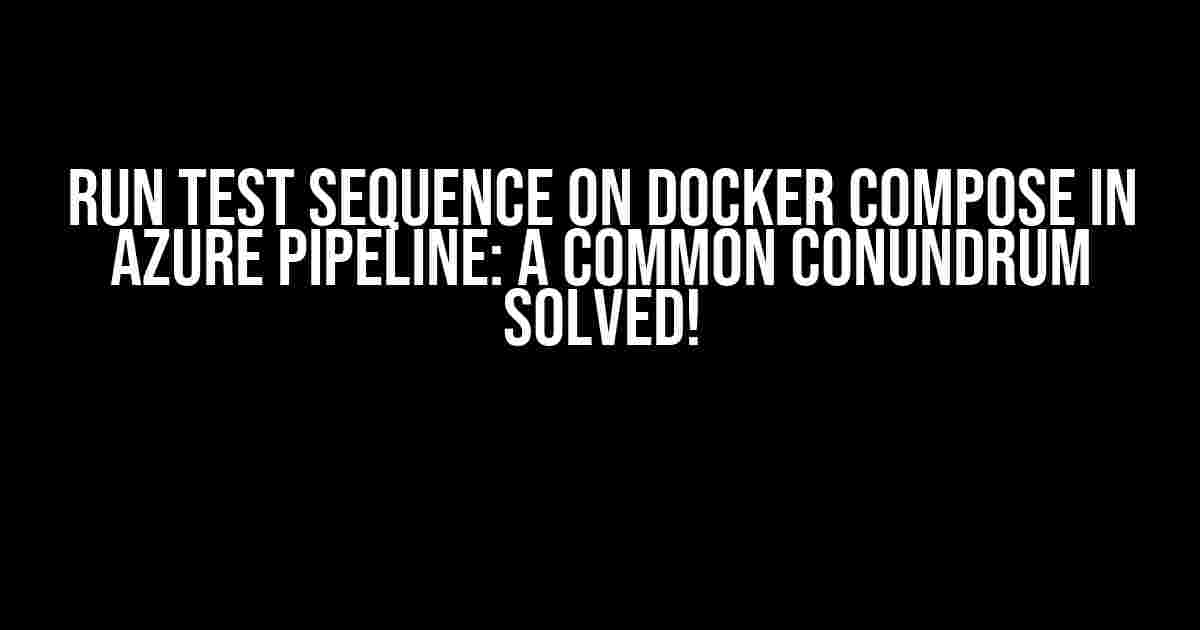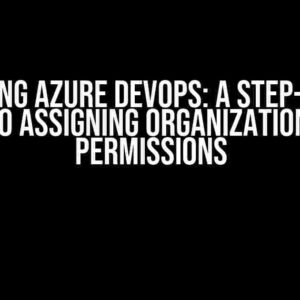Are you stuck in the vortex of Azure pipelines, wondering why your Docker Compose test sequence refuses to keep running? You’re not alone! In this article, we’ll delve into the world of Azure pipelines, Docker Compose, and test sequencing to shed light on this frustrating issue. Buckle up, folks, and get ready to overcome this hurdle once and for all!
- The Setup: Docker Compose, Azure Pipelines, and Test Sequencing
- The Problem: Docker Compose Test Sequence Won’t Keep Running
- The Solution: Understanding the Docker Compose Test Sequence
- The Fix: Using Docker Compose’s Detach Mode and Azure Pipelines’ Continue on Error
- Putting it All Together
- Conclusion
The Setup: Docker Compose, Azure Pipelines, and Test Sequencing
Before we dive into the solution, let’s quickly review the setup that’s causing the trouble.
- Docker Compose: A powerful tool for defining and running multi-container Docker applications.
- Azure Pipelines: A cloud-based service for continuous integration and delivery (CI/CD) that supports a wide range of languages and platforms.
- Test Sequencing: A process of running multiple tests in a specific order, often used to ensure that tests are executed in a particular sequence.
In this scenario, we’re using Azure Pipelines to run a Docker Compose test sequence. The problem arises when the test sequence doesn’t keep running, leaving you wondering what went wrong.
The Problem: Docker Compose Test Sequence Won’t Keep Running
When you run a Docker Compose test sequence in Azure Pipelines, you might encounter an issue where the sequence doesn’t continue running after the first test. This can be frustrating, especially if you’ve invested hours into setting up your pipeline.
The error message might look something like this:
Error: The pipeline is not running. The test sequence is not continuing.
Or, you might see a more cryptic error message that doesn’t provide much insight into the problem:
Error: An error occurred while running the pipeline.
In either case, it’s essential to identify the root cause of the issue to resolve it effectively.
The Solution: Understanding the Docker Compose Test Sequence
To solve this problem, we need to understand how Docker Compose test sequences work in Azure Pipelines. Here are the key points to keep in mind:
- Docker Compose up: When you run a Docker Compose test sequence, Azure Pipelines executes the `docker-compose up` command, which starts the containers defined in your `docker-compose.yml` file.
- Container exit codes: When a container exits, it returns an exit code. If the exit code is non-zero, the pipeline will fail, and the test sequence won’t continue.
- Test sequence execution: Azure Pipelines executes the test sequence in a specific order, defined by the `test` section in your `docker-compose.yml` file. If a test fails or the container exits with a non-zero code, the sequence won’t continue.
With this understanding, let’s move on to the solution.
The Fix: Using Docker Compose’s Detach Mode and Azure Pipelines’ Continue on Error
To resolve the issue, we’ll use a combination of Docker Compose’s detach mode and Azure Pipelines’ continue on error feature.
Step 1: Update Your Docker Compose File
In your `docker-compose.yml` file, add the `detach: true` option to the test service:
version: '3'
services:
test:
build: .
command: ["bash", "-c", "run-tests.sh"]
detach: true
This tells Docker Compose to run the test service in detach mode, which allows the container to run in the background and continue executing even if the pipeline fails.
Step 2: Configure Azure Pipelines to Continue on Error
In your Azure Pipelines YAML file, add the `continueOnError: true` option to the test task:
steps:
- task: DockerCompose@0
displayName: 'Run test sequence'
inputs:
azureSubscription: $(azureSubscription)
azureResourceManagerConnection: $(azureResourceManagerConnection)
action: 'run'
dockerComposeFile: '**/docker-compose.yml'
detached: true
continueOnError: true
This tells Azure Pipelines to continue executing the pipeline even if the test sequence fails or the container exits with a non-zero code.
Putting it All Together
With these changes in place, your Docker Compose test sequence should now continue running even if a test fails or the container exits with a non-zero code.
| Before | After |
|---|---|
| Test sequence fails or container exits with non-zero code | Test sequence continues running, and pipeline execution continues |
| Pipeline fails, and test sequence doesn’t continue | Pipeline continues executing, and test sequence runs to completion |
By using Docker Compose’s detach mode and Azure Pipelines’ continue on error feature, you can ensure that your test sequence runs to completion, even if individual tests fail or containers exit with non-zero codes.
Conclusion
In conclusion, running a Docker Compose test sequence in Azure Pipelines can be a challenge, but with the right approach, you can overcome the hurdles and ensure that your pipeline runs smoothly. By understanding the Docker Compose test sequence and using detach mode and continue on error features, you can resolve the issue of the test sequence not continuing to run.
Remember, a well-designed pipeline is essential for continuous integration and delivery. With these tips and tricks, you’ll be well on your way to creating a robust pipeline that runs your Docker Compose test sequence with ease.
Happy debugging, and may the pipeline be with you!
Frequently Asked Question
Get answers to the most pressing questions about running test sequences on Docker Compose in Azure Pipelines!
Why does my Docker Compose test sequence stop running in Azure Pipelines?
This issue usually occurs when the test sequence is running in detached mode (-d flag). Try removing the -d flag and see if it resolves the issue. If not, check your Azure Pipelines logs for any error messages that might indicate the problem.
What if I need to run my Docker Compose test sequence in detached mode?
No problem! You can use the `docker-compose up` command with the `-d` flag, but make sure to add `tty: true` to your `docker-compose.yml` file. This will allow the container to keep running even after the pipeline finishes.
Can I use Azure Pipelines’ built-in Docker Compose task to run my test sequence?
Yes, you can! The built-in Docker Compose task in Azure Pipelines can be used to run your test sequence. However, make sure to configure the task correctly, as it has some limitations compared to running Docker Compose manually.
Why do I get a “container not found” error when running my Docker Compose test sequence?
This error usually occurs when the container is not running or has been stopped. Check your Azure Pipelines logs to see if the container is being stopped or if there are any error messages indicating why the container is not running.
How can I troubleshoot issues with running my Docker Compose test sequence in Azure Pipelines?
Start by checking the Azure Pipelines logs for error messages or warnings that might indicate the problem. You can also try running the Docker Compose command manually in the pipeline to see if the issue persists. Additionally, you can use Docker Compose’s built-in debug logging feature to get more detailed output.



